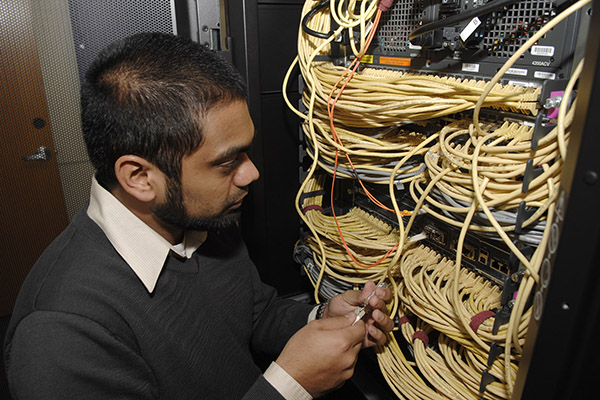
Cyber Security Month puts focus on keeping information safe
Firewalls are good. Phishing is bad.
And your dog’s name is not a valid password.
For better or worse, the jargon and rules of cyber security are now part of our vocabulary. October is National Cyber Security Awareness Month, and Georgia Perimeter—along with other University System of Georgia institutions—is urging all computer users to “Stop, Think, Connect” in order to keep sensitive information safe.
“Our job is to do all we can to protect the institution’s information—from paper to digital,” says Ren Flot, GPC director of Information Security. Cyber security includes safeguarding the physical networks as well as student information and all sensitive institutional data.
GPC is in the process of installing new safeguards that will help keep its network more secure, says Flot.
“Our network infrastructure team is in the process of completing a network refresh, upgrading the entire network with some of the latest gear designed with advanced safety features built in," he says. “GPC is actually one of the few institutions that now have next-generation security and firewall technologies in place for additional protection. These systems are much more capable than our old firewalls at detecting malware. This will have a dramatic increase on our ability to block malicious actions against our network.”
“Securing the Human,” a new security awareness training program for all faculty and staff, will be offered as well. “It’s a comprehensive set of training videos covering information security best practices and do’s and don’ts for the workplace and in our personal computing,” Flot says.
“This program will go a long way in helping us train and educate computer users about the many dangerous aspects of using computers and the internet today,” explains Flot. “These include types of attacks, how different exploits work, hacker methodologies, dangerous actions to avoid, best practices for computer operations and information on laws and regulations we must follow.”
Other cyber security changes at GPC include:
1. A new USG-wide policy to increase password characters to 10 minimum. “This will make our user passwords harder to crack for hackers,” Flot says.
2. Products that will help people manage their passwords—creating stronger passwords that don't necessarily have to be remembered.
3. A new, two-factor authentication process for users of critical information, such as in student accounts and accounting, is currently being researched.
Flot shared these tips to keep items secure on the internet:
1. Email is not secure. Don’t open suspect emails with attachments, catchy subject lines or from unknown senders. Delete immediately.
2. Never forward SPAM or scam messages and don’t click on any links contained in these types of messages.
3. Don’t send sensitive information—including Social Security numbers, credit cards, other financial information and FERPA and HIPAA protected information—via email unless it’s encrypted first.
4. Change your passwords regularly. Don’t use your birthday, family names, pet names or company name. Don’t use the same password for multiple accounts. Don’t write your passwords down and don't ever share them with anyone. Use an online password manager program such as LastPass or RoboForm to help you create strong, complex passwords without having to remember them all.
5. Look at the web address when banking or shopping online to ensure you are on the legitimate website you intend to do business with.
6. Report phishing attempts to the GPC service desk.
Visit the Stay Safe Online website for additional information on how to keep your data secure on the internet.
